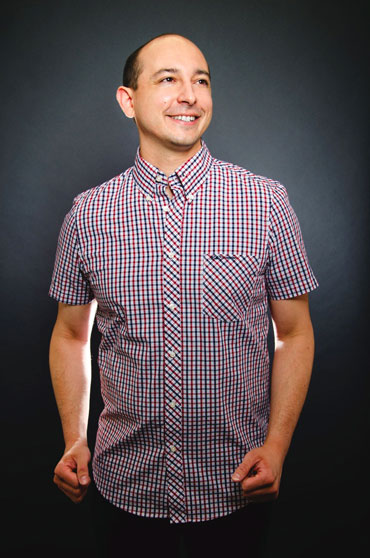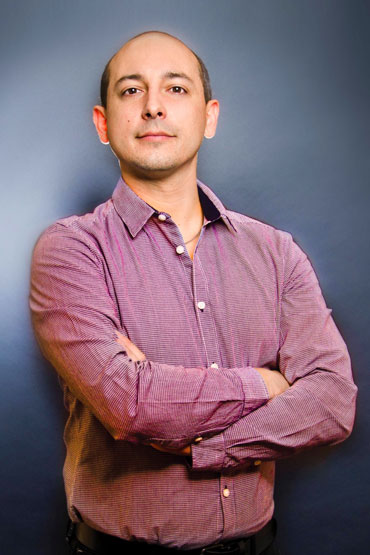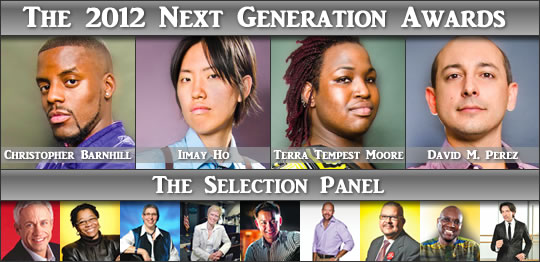Some gay people grow up to run screaming from conservative Christian upbringings. Not David M. Pérez. This Southern California native embraced the values of his youth and carries them forward into his social-justice work today.
''I did my high school career report on being a pastor or a missionary,'' he shares, fully committed at one point to adulthood as Pastor David, president of his high school's Christian club. ''I always had that hunger, I think from my parents, to give back and to help other people, to love your neighbor as yourself. … My parents were kind of my examples in Jesus Christ as my example for social justice, having concern for other folks. That's one of the longest identities for me.''

David M. Perez
(Photo by Julian P. Vankim)
As Pérez grew up, though, other identities emerged. During his undergraduate years at Biola University, a private Christian institution in Southern California, studying Spanish, social science and biblical studies, Pérez thought there might be better ways to mold his career. Maybe his calling wasn't the pulpit. Serving humanity, however, was a fixed variable in Pérez's formula.
''I realized that maybe my mission was helping folks in a different way that wasn't necessarily being a pastor at church or missionary, but through politics or through advocacy,'' he says of his undergrad transformation – a transformation that essentially brought him to D.C. and Georgetown University's School of Foreign Service to earn a master's degree in Latin American studies. That transformation also included coming out.
''I came out in August 2006 to my friends here in D.C.,'' remembers Pérez, today 28. ''I was with two straight friends and two gay friends, actually, at Cobalt. It just finally slipped out. I'd been trying to tell folks for a long time. I'm really close to my family and I wanted to tell them in person. There was crying, it was an emotional experience. We're still learning how to communicate. I haven't brought anyone home yet. I would hope someday I could bring someone home and they'd be accepting. They know about my boyfriend, Gary.''
That's not to say that things are tense with his family. When Pérez heads west to visit, he cherishes his time with his parents and two siblings, and even happily heads back to the conservative church of his youth.
''If I'm in town,'' which is fairly consistently, ''they love me to be there on Sunday. Everyone knows me from growing up. Everyone's really friendly. Everyone is kind to me and treats me well. I'm sure they all know I'm gay, but people treat me the same way, with respect. It's the golden rule that Jesus taught. They're conservative, evangelical – but in Southern California. Moving here to the East Coast, I learned 'conservative' is a little different.''
Pérez also learned, as adults should, to tread his own path; to take the principles instilled in him by his parents and church and move forward with them. That path has taken him to all sorts of places in D.C. At Georgetown, he even had the good luck to get some guidance on that path from Joseph Palacios, one of his professors – and an openly gay, Latino, Catholic priest.

David M Perez
(Photo by Julian P. Vankim)
''The class was about sociology, something I had never studied that I was really interested in learning about,'' Pérez says. ''And with him as a priest and having the gay identity, I really loved it, felt that it really aligned with my own work, being gay and being involved in the church. I became good friends with him. He understands being in a faith community and being gay, kind of working through those different identities. He's a great guy.''
Palacios returns the compliment, saying, ''The thing I admire most is he's a critical thinker. He looks at the larger picture. People in D.C. tend to get into their silos of interest. David is trying to do multiple silos.''
That's something of an understatement, considering Pérez's various commitments, on top of his demanding full-time job as director of development at the League of United Latin American Citizens (LULAC), the nation's largest and oldest Latino civil rights organization, founded in 1929.
Pérez helped launch the area's first gay Latino softball team, Ball Busters – a nod to his impish sense of humor – which has since morphed into a kickball team.
He's fully committed to the spiritual home he found in D.C., St. Thomas's Parish Episcopal Church in Dupont Circle – even if he characterizes his contribution as an usher and cleaning up after the church's weekly coffee hour as a steep pull-back from past participation at the church.
''Right now, I'm just part of what they call the Parrish Life Cluster.'' Whatever the terminology, Pérez's commitment to the church is deep.
''What I love about the Episcopal Church is they talk about the foundation of faith is Scripture, tradition and reason,'' he says. ''I had gone from a very boxed-in, more narrow faith, to more progressive. They are very progressive in terms of social justice, of being LGBT-inclusive. I love the community there.''
Possibly Pérez's greatest commitment beyond LULAC, though, is his current term as president of D.C.'s Latino GLBT History Project, founded in 2000 by longtime D.C. activist José Gutierrez. Now in the middle of his two-year term, he's filled the post with gusto, extending the organization to help form the grassroots D.C. Queer People of Color collective (DC QPOC), grow Latino Pride and better establish the organization online, among other feats.
''José Gutierrez, the founder and immediate past president, is one of my mentors,'' Pérez says. ''He really showed me a lot about getting involved here, locally in D.C. Working at a national organization, I said, 'You know, I want to volunteer in a local group to give back to where I live.' I felt like I was disconnected. And this is my home. I'm a registered voter here. I pay taxes.''
Today, Pérez is the embodiment of a committed community member, making D.C. his genuine home, and enriching it daily. The Metro Weekly Next Generation Award is a testament to that dedication, and Pérez is thrilled by the recognition.
''I'm really honored. This is the first award in a really long time I've gotten. And some of the other awardees are really good friends, so I'm really honored.
''I really love working in the advocacy space, for an advocacy organization. Doing something good for the community, that really excites me, makes me want to work, to go back and be involved in my volunteer work.''
 ...more
...more